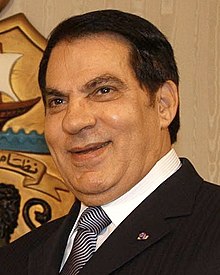
Back زين العابدين بن علي Arabic زين لعابدين بنعلي ARY زين العابدين بن على ARZ Zine El Abidine Ben Ali AST Zeynalabdin bin Əli Azerbaijani Зін эль-Абідзін Бен Алі Byelorussian Зін эль-Абідзін Бэн Алі BE-X-OLD Зин Абидин бен Али Bulgarian Zine El Abidine Ben Ali Catalan زەینەلعابدین کوڕی عەلی CKB
Zine El Abidine Ben Ali | |
|---|---|
| زين العابدين بن علي | |
 Ben Ali in 2008 | |
| 2nd President of Tunisia | |
| In office 7 November 1987 – 14 January 2011 | |
| Prime Minister | Hédi Baccouche Hamed Karoui Mohamed Ghannouchi |
| Preceded by | Habib Bourguiba |
| Succeeded by | Mohamed Ghannouchi (interim) |
| Prime Minister of Tunisia | |
| In office 2 October 1987 – 7 November 1987 | |
| President | Habib Bourguiba |
| Preceded by | Rachid Sfar |
| Succeeded by | Hédi Baccouche |
| Personal details | |
| Born | 3 September 1936 Hammam Sousse, French Tunisia |
| Died | 19 September 2019 (aged 83) Jeddah, Saudi Arabia |
| Resting place | Al-Baqi Cemetery, Medina, Saudi Arabia |
| Political party | Socialist Destourian Party (1986–1988) Constitutional Democratic Rally (1988–2011) |
| Spouses | |
| Children |
|
| Alma mater | Special Military School of Saint Cyr School of Applied Artillery Senior Intelligence School in Maryland School for Anti-Aircraft Field Artillery in Texas |
| Full name | Zine El Abidine Ben Haj Hamda Ben Haj Hassen Ben Ali[1] |
| Military career | |
| Allegiance | |
| Service | |
| Years of service | 1958–1980 |
| Rank | Brigadier general |
Zine El Abidine Ben Ali (Arabic: زين العابدين بن علي, romanized: Zayn al-ʿĀbidīn bin ʿAlī, Tunisian Arabic: Zīn il-ʿĀbdīn bin ʿAlī; 3 September 1936 – 19 September 2019), commonly known as Ben Ali or Ezzine, was a Tunisian politician who served as the second president of Tunisia from 1987 to 2011. In that year, during the Tunisian revolution, he was overthrown and fled to Saudi Arabia.
Ben Ali was appointed Prime Minister in October 1987. He assumed the Presidency on 7 November 1987 in a bloodless coup d'état that ousted President Habib Bourguiba by declaring him incompetent.[2] Ben Ali led an authoritarian regime.[3] He was reelected in several non-democratic elections where he won with enormous majorities, each time exceeding 90% of the vote, his final re-election coming on 25 October 2009.[4][3] Ben Ali was the penultimate surviving leader deposed in the Arab Spring; he was survived by Egypt's Hosni Mubarak, the latter dying in February 2020.
On 14 January 2011, following a month of protests against his rule, he fled to Saudi Arabia along with his wife Leïla Ben Ali and their three children. The interim Tunisian government asked Interpol to issue an international arrest warrant, charging him with money laundering and drug trafficking. A Tunisian court sentenced Ben Ali and his wife in absentia to 35 years in prison on 20 June 2011 on charges of theft and unlawful possession of cash and jewelry, which was put up for auction.[5][6] In June 2012, a Tunisian court sentenced him in absentia to life imprisonment for inciting violence and murder and another life sentence by a military court in April 2013 for violent repression of protests in Sfax.[7] He served none of those sentences, subsequently dying in Jeddah, Saudi Arabia, on 19 September 2019 at the age of 83 after nearly a decade in exile.
- ^ Cite error: The named reference
DCAwas invoked but never defined (see the help page). - ^ "A Coup is reported in Tunisia". The New York Times. Associated Press. 7 November 1987. ISSN 0362-4331. Archived from the original on 13 June 2018. Retrieved 2 May 2010.
- ^ a b Wolf, Anne (2023). Ben Ali's Tunisia: Power and Contention in an Authoritarian Regime. Oxford University Press. ISBN 978-0-19-286850-3.
- ^ Yannick Vely (23 November 2009). "Ben Ali, sans discussion". Paris-Match (in French). Archived from the original on 29 October 2009. Retrieved 2 May 2010.
- ^ Cite error: The named reference
huffingwas invoked but never defined (see the help page). - ^ Cite error: The named reference
guardwas invoked but never defined (see the help page). - ^ "Tunisia's Ben Ali sentenced for incitement to murder". 13 June 2012. Archived from the original on 17 June 2019. Retrieved 20 June 2018.